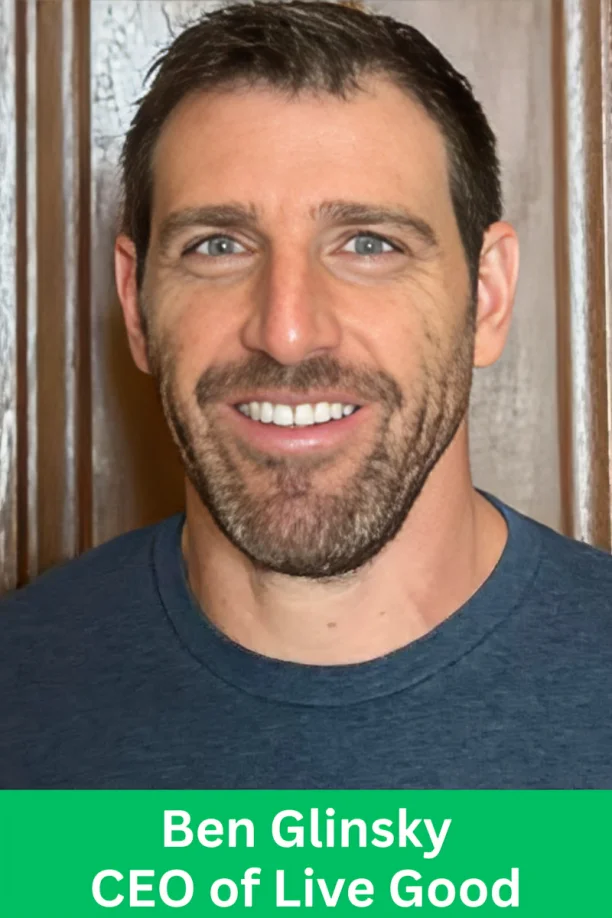Launched officially in late 2022, LiveGood has quickly positioned itself as one of the most talked-about companies in the wellness and direct-selling industries. Founded by Ben Glinsky, a veteran entrepreneur with two decades in MLM and eCommerce, LiveGood’s mission is simple yet bold: Now visit MLM Ranks.
“To fix what’s broken in the MLM world: overpriced products, limited access, and unrealistic promises while delivering real health at real prices.”
The company blends direct-to-consumer (DTC) simplicity with affiliate marketing scalability, offering clean-label supplements through a low-cost membership model that appeals to both customers and business builders.
LiveGood’s philosophy centers on accessibility and integrity. Rather than relying on inflated product pricing or mandatory monthly autoships, common pitfalls of MLMs, LiveGood allows members to enjoy wholesale pricing for just $9.95 per month or $99 per year.
This model democratizes wellness, allowing everyday consumers to afford premium nutrition without financial strain. The result? A brand that’s not just selling supplement,s it’s selling empowerment.

Ben Glinsky, CEO and founder, has built a career at the intersection of innovation and controversy. Known for creating Skinny Body Care (2011–2018), one of the first viral Facebook-based health MLMs, Glinsky gained a reputation for pioneering automated sales funnels that attracted thousands of affiliates.
Now, with LiveGood, he’s returning to the industry with a mission of reform.
“We built LiveGood to make real health affordable and to give people an honest income path.”
Glinsky’s past ventures taught him what doesn’t work: overpriced products, complex qualification systems, and hype-driven sales. LiveGood represents his attempt to merge honest value with digital scalability.
LiveGood operates as a hybrid between MLM and membership-based eCommerce, taking cues from successful subscription models like Costco and Amazon Prime — but with an affiliate twist. Members pay a $9.95 monthly or $99 annual fee to access wholesale supplement pricing. This allows consumers to enjoy products priced 50–70% lower than comparable MLM brands. The membership can be purely for discounts, with no obligation to sell. For those interested in building income, affiliates pay a $49.95 one-time enrollment fee and the same monthly membership fee. This grants access to LiveGood’s 2×15 matrix compensation plan, retail commissions, and fast-start bonuses.
There’s no mandatory product purchase, which sets it apart from traditional network marketing schemes.
LiveGood’s strength lies in its clean-label, science-based product portfolio. All items are non-GMO, vegan-friendly, gluten-free, and third-party tested.
All products are made in U.S. facilities under strict GMP standards and come with a 90-day “empty bottle” satisfaction guarantee.
LiveGood’s primary differentiator is pricing. Comparable supplements from legacy MLMs (e.g., Isagenix, Herbalife, or Amway) often cost 2–3 times more. By removing layers of markups, LiveGood’s model directly passes savings to members. Most MLMs require mandatory monthly product purchases to stay “active.” LiveGood breaks that mold. Affiliates can earn commissions without buying a single product, an unprecedented shift in network marketing ethics.
LiveGood’s pay plan is one of its most viral aspects, combining passive matrix payouts with direct bonuses.
Affiliates participate in a 2×15 forced matrix, where each member can only have two direct recruits under them the rest spill over into lower levels. As the matrix fills, members earn up to $2,047.50 per month without recruiting beyond their immediate network.
Every new sign-up generates a $25 fast start bonus for the enroller, plus matching bonuses for sponsors up to 5 levels deep.
Ranks range from Bronze to Diamond, unlocking deeper levels of the matrix and additional leadership bonuses. Even small teams can earn meaningful recurring income due to the spillover mechanics.
LiveGood’s growth has been nothing short of explosive. In just two years, it has expanded to over 950,000 members worldwide, driven largely by automated recruitment funnels and global online marketing.
The company appeals to:
Interestingly, LiveGood markets itself as “anti-MLM,” despite using MLM mechanics. This transparency, “We’re fixing MLM from the inside,” has resonated with audiences disillusioned by old-school direct selling.
Scholarly and trade sources have begun analyzing companies like LiveGood for their innovative pricing and hybrid structure. According to Direct Selling Journal (2023), “LiveGood’s model reflects a growing demand for transparency and affordability in wellness marketing.” The cost disruption it offers may influence future MLM reform. Experts like Barassi (2020) and Rahim (2025) caution that even innovative MLM hybrids must ensure data protection, truthful advertising, and equitable income opportunities to maintain credibility.
Despite its claims of fairness, LiveGood hasn’t publicly released a full income disclosure statement. Data from independent analysts suggest the majority of affiliates earn under $100/month, which aligns with industry averages. Critics argue that despite its affordability, recruitment remains the core growth engine.
Some watchdogs have noted structural similarities between LiveGood and Glinsky’s earlier company, Skinny Body Care, which faced scrutiny for its recruitment-heavy approach. However, LiveGood’s product-first narrative and no-purchase requirement represent a notable ethical evolution.
Looking ahead, LiveGood aims to expand deeper into Latin America, Africa, and Asia, focusing on localized e-commerce and mobile-first platforms. The company plans to launch new formulations in 2025, including immune blends, collagen boosters, and family wellness packs.
Glinsky’s long-term vision?
“A world where every household can afford good health, without gimmicks or overpriced hype.”
If executed well, LiveGood could become the Costco of wellness, bridging the gap between accessibility and entrepreneurship.
LiveGood’s rise under Ben Glinsky represents a new chapter in direct selling one rooted in transparency, affordability, and digital empowerment. By combining low-cost, high-quality products with a fair membership system, the company challenges the MLM status quo while meeting real consumer needs.
However, like any opportunity, success depends on realistic effort and ethical leadership. LiveGood may not be perfect, but it stands as one of the most progressive and accessible health companies of 2025, proving that wellness and wealth don’t have to come at a premium.
Get more information
There are no reviews yet. Be the first one to write one.
